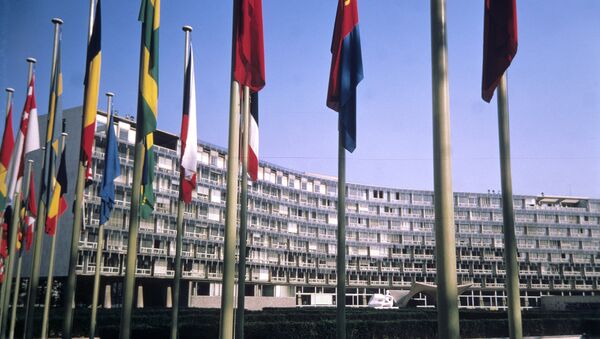MOSCOW, November 16 (Sputnik) — The United Nations Educational, Scientific and Cultural Organization (UNESCO) was established on November 16, 1945.
The UNESCO Constitution was adopted at a conference in London in November 1945 and came into force on November 4, 1946, after ratification by the twenty participating states.
The organization currently has 193 members and 7 associate members, i.e. territories which are not responsible for the conduct of their international relations.
The Soviet Union was the 70th member to join UNESCO in 1954.
The organization has over 60 bureaus and affiliates located in various parts of the world.
UNESCO headquarters are in Paris, France.
UNESCO's objective is to contribute to peace and security in the world by promoting collaboration among nations through education, science, culture and communication in order to further universal respect for justice, for the rule of law and for the human rights and fundamental freedoms which are affirmed for the peoples of the world, without distinction of race, sex, language or religion, by the Charter of the United Nations.
UNESCO performs five principle functions:
— The research of potentially useful forms of education, science, culture and communication;
— The advancement, transfer and sharing of knowledge relying mainly on scientific research, training and teaching;
— Regulatory activities, drafting and adopting international treaties and mandatory recommendations;
— Expert advice for member states on their development policies and projects in the form of technical cooperation;
— The exchange of specialized information.
Governing bodies
The General Conference includes representatives of all member states. It is held once every two years and involves member states and associate members. The General Conference is also attended by observer states that are not members of UNESCO, intergovernmental organizations, NGOs and foundations.
The working languages of the General Conference are English, Arabic, Spanish, Chinese, Russian and French.
Each member state has one vote at the General Conference regardless of its population and its contribution to the budget. The General Conference defines the general course of UNESCO's activity, approves UNESCO's programs and budget for the next two years, and elects members of the Executive Board every four years as well as the Director-General.
The Director-General is elected every four years (previously, every six years) and is in charge of the Secretariat.
The Executive Board is UNESCO's main working body. The Executive Board ensures the overall management of UNESCO. It prepares the work of the General Conference and sees that its decisions are properly carried out. The functions and obligations of the Executive Board are generally defined in the Constitution and Rules of Procedure or Directives adopted by the General Conference. In addition to these regulations there are the resolutions of the General Conference. Every two years, the General Conference assigns the Executive Board with particular tasks. Other functions are determined by agreements between UNESCO and the UN, specialized institutions and other inter-governmental organizations.
The General Conference elects 58 members to the Executive Board. The choice of these representatives is largely a matter of the diversity of the cultures they represent, as well as their geographic origin. The Executive Board meets twice a year.
The Secretariat is a UNESCO executive body. Supervised by a Director-General elected for six years, the Secretariat carries out programs approved by the member states.
UNESCO awards international prizes in the area of its competence. Among them are Felix Houphouet-Boigny Peace Prize and L'Oreal-UNESCO Awards For Women in Science.
UNESCO also observes international days and anniversaries and participates in the celebration of memorable dates of its member states.




